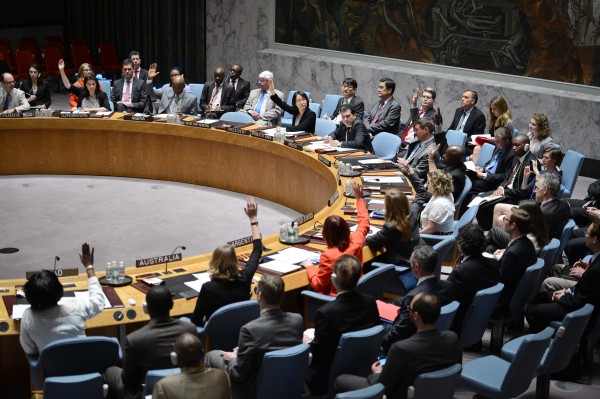

Follow us on:  
|

Although passed unanimously, the UNSC Resolution was not without its usual diatribes between Russia and the US.

The resolution, tabled by Sweden and Kuwait, passed 15-0 after three days of wrangling over wording [Xinhua]
After three days of delays over wording of the document, the United Nations Security Council on Saturday unanimously passed Resolution 2401 which called for all parties in the Syrian conflict to an immediate ceasefire which would last for at 30 consecutive days.
The Resolution called on all parties to “facilitate safe and unimpeded passage for medical personnel and humanitarian personnel exclusively engaged in medical duties, their equipment, transport and supplies … to all people in need consistent with international humanitarian law”.
It also said that medical facilities and schools should be demilitarized.
Resolution 2401 also called on the Syrian army to lift its sieges of Eastern Ghouta (suburb of Damascus), Yarmouk, Foua and Kefraya and demanded of all warring parties to allow the rapid humanitarian aid deliveries and medical assistance without hindrance.
But the meeting of the 15 Security Council members was not without its Cold War-era jabs.
US Ambassador to the UN accused Russia of delay tactics and obstruction for a text that could have passed days earlier and prevented further loss of life.
“Every minute this council waited on Russia, the human suffering grew,” she said right after the unanimous vote was taken.
The UN estimates that over 400 people have been killed and thousands wounded in just one week of fighting. The US and its allies blame the government of Bashar Al Assad for the fighting and what they call indiscriminate bombing of civilian areas.
She also said she was very skeptical that the Syrian government would comply with the resolution.
“And after all of this time, hardly anything has changed in the resolution except a few words and some commas.”
Russian Ambassador Vassily Nebenzia said the humanitarian situation in Eastern Ghouta was “dire” and insisted that hospitals and schools be demilitarized, indicating that Islamist rebels were using them to hide and store weapons.
But he said that the US was operating like an occupying power with territorial ambitions in Syria, and blamed the US and foreign supported Islamist militias, such Al Nusra, the Islamic State and Al-Qaeda of the carnage and humanitarian crisis in Syria.
He said a ceasefire would not work in the long run unless concrete agreements are secured between the warring parties.
He also reminded the Security Council that the Resolution did not preclude operations against Islamic State, Al-Qaeda and Al-Nusra, some of whom are holed up in Eastern Ghouta and elsewhere in Syria.
Two other factions also dominate Eastern Ghouta – Jaysh Al Islam and Ahrar Al Sham.
The BRICS Post with inputs from Agencies